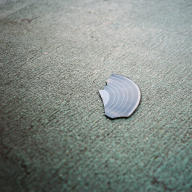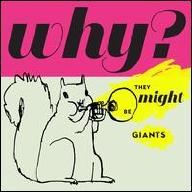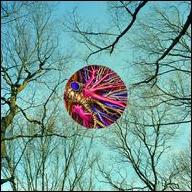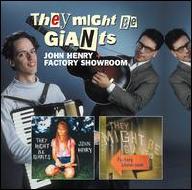Flansburgh and Linnell met when they were children in Lincoln, Massachusetts. During high school, they began writing songs together, but they never officially formed a band. The Johns went to different colleges after high school, with Linnell playing in the Mundanes, a new wave group from Rhode Island. By 1981, the pair had reunited, deciding to move to Brooklyn to pursue a musical career. Performing as El Grupo De Rock, the duo's first show was at a Sandinista rally in Central Park. Soon after Flansburgh and Linnell settled on the moniker They Might Be Giants, taking the name from a George C. Scott film. Performing their original material with Flansburgh on guitar, Linnell on accordion and saxophone and backed by a drum machine, They Might Be Giants soon became fixtures on the Manhattan underground. When Linnell broke his wrist in a biking accident, the resourceful duo founded the Dial-A-Song service by recording their songs on an answering machine and advertised their phone number locally. Over the years, it was a successful venture; at one point, the service was receiving hundreds of calls a day. Starting in 1984, They Might Be Giants had a monthly gig at the Lower East Side club Darinka for three years, by the end of which they were selling out their performances. In March 1985, the duo released a 7" that included demos of several songs.
On the strength of these demos -- which were reviewed in People magazine -- They Might Be Giants scored a deal with Bar/None Records. Recorded at the Public Access Synthesizer Studio and Dubway Studios, 1986's They Might Be Giants mixed synth pop and power pop with elements of folk, country (the song "Boat of Car" features a prominent sample of Johnny Cash's "A Boy Named Sue"), novelty pop, and jazz ("Rhythm Section Want Ad" interpolates Raymond Scott's "Powerhouse"). The album earned critical acclaim and became a college radio hit, selling 10,000 copies in its first year of release and establishing Bar/None as a label in the process. One of the album's singles, "Don't Let's Start," made waves thanks to its inventive video (which featured some of the absurd props the band used in its live show) and helped push They Might Be Giants' eventual sales to over 100,000 copies. Linnell and Flansburgh expanded their following with their next album, September 1988's Lincoln. Like its predecessor, it was recorded on eight-track tape at Dubway Studios, but boasted more wide-ranging sounds and songwriting that touched on heartache and social critique. Named for the duo's hometown, Lincoln doubled the sales of their debut and peaked at number 89 on the Billboard Hot 200 Albums chart, where it stayed for 19 weeks. One of the album's singles, "Ana Ng," hit number 11 on Billboard's Modern Rock chart.
Lincoln's success led They Might Be Giants to sign with Elektra Records in 1989. The band's third album, Flood, appeared in January 1990 and reflected their status as a major label act. Recorded at Skyline Studios and featuring production by Clive Langer and Alan Winstanley on several tracks, the album featured a notably more polished but still eclectic sound that encompassed elements of country as well as unconventional drum sounds sampled from sources like Flansburgh's kitchen sink. Flood reached number 75 on the Billboard 200 Albums chart and was ultimately certified platinum by the RIAA; in the U.K., it was eventually certified gold. The album's singles also fared well: "Birdhouse in Your Soul" peaked at number three on the Billboard Modern Rock chart and also charted in the U.K. and Ireland. "Twisting" reached number 22 on the Modern Rock chart, while the band's cover of the Four Lads' 1953 song "Istanbul (Not Constantinople)" -- which They Might Be Giants played in their early days to fill out their setlists -- hit number 61 on the U.K. Singles Chart. In addition, the animated TV show Tiny Toon Adventures aired videos for "Istanbul (Not Constantinople)" and "Particle Man," giving the duo a new, younger audience.
After the release of 1991's B-sides and rarities compilation Miscellaneous T in 1991, They Might Be Giants returned with their fourth album Apollo 18 in March 1992. Named for the cancelled space mission that was supposed to follow Apollo 17, the album coincided with the band being named the official musical ambassadors of International Space Year by NASA (the duo came to the agency's attention while searching for imagery for the album's artwork at the NASA Archive Center). As on Flood, They Might Be Giants pushed themselves musically. Recorded at New York's Magic Shop studio, Apollo 18 had fuller instrumentation and a darker tone than their previous albums, and included a suite of very short songs called "Fingertips" that could be sprinkled throughout the album when the CD release was played in shuffle mode. The album peaked at number 99 on the Billboard 200 and reached number 59 on Australia's ARIA albums chart; the single "The Statue Got Me High" made it to 24 on the Billboard Modern Rock chart. For the album's supporting tour, They Might Be Giants performed with a full backing band for the first time, hiring former Pere Ubu bassist Tony Maimone and drummer Jonathan Feinberg. They Might Be Giants' first release with a full band lineup was September 1993's Why Does the Sun Shine? (The Sun Is a Mass of Incandescent Gas) EP, which featured covers of songs by the Allman Brothers, Meat Puppets, and Hy Zaret, whose 1959 song provided the release's title track.
Following August 1994's Back to Skull EP, They Might Be Giants issued their fifth full-length John Henry that September. Balancing a heavier, more guitar-oriented sound with songs alluding to Allen Ginsberg's Howl, expressionist Belgian painter James Ensor, and Alice Cooper, the album featured contributions from Maimone as well as guitarist Robert Quine and reached number 61 on the Billboard 200 Albums chart. For October 1996's Factory Showroom, the band added second guitarist Eric Schermerhorn into the fold, incorporated more of their early electronic pop into its sound, and recorded a song on wax cylinder at the Edison Laboratory. The album failed to chart in the U.S., however, and They Might Be Giants parted ways with Elektra after its release. The band moved to Restless for 1998's Severe Tire Damage, a mostly live album that also included the previously unreleased studio track "Doctor Worm." Bassist Danny Weinkauf and guitarist Dan Miller joined They Might Be Giants around this time, and in 1999, the band became the first established musical act to release an album exclusively online with Long Tall Weekend. That year, they appeared on the soundtrack to Austin Powers: The Spy Who Shagged Me with the song "Dr. Evil."
They Might Be Giants began the 2000s with a plethora of projects. May 2000 saw the release of the Working for the Man EP, which featured several songs that appeared on the band's next album. Arriving in September 2001, Mink Car was another quintessentially eclectic release that the band recorded while on tour from 1999 to 2001 and included collaborations with M. Doughty, Adam Schlesinger, and the Elegant Too. The making of Mink Car was captured in Gigantic (A Tale of Two Johns), a documentary by AJ Schnack. Also in 2001, the band wrote songs accompanying an issue of McSweeney's literary journal as well as "Boss of Me," the theme song to the television series Malcolm in the Middle (which also featured the band's other songs in its episodes). The song became They Might Be Giants' second top 40 hit in the U.K., and earned them their first Grammy for Best Song Written for a Motion Picture, Television or Other Visual Media. They rounded out the year with that November's They Might Be Giants In … Holidayland, an EP of festive songs collected from prior releases.
They Might Be Giants celebrated their 20th anniversary with June 2002's No! Co-released by Rounder Records and the band's own Idlewild imprint, their first album for the whole family won acclaim for its lighthearted songs. That year also saw the release of two compilations: The rarities collection They Got Lost appeared that July, while the retrospective Dial-A-Song: 20 Years of They Might Be Giants followed in September. The following year, Flansburgh and Linnell joined Canadian artist Marcel Dzama for the children's book and CD set Bed, Bed, Bed. In 2004, The Indestructible Object EP arrived a few months before that July's full-length album, The Spine. The album was accompanied by an EP, The Spine Surfs Alone. That year, drummer Marty Beller joined the band. Also in 2004, They Might Be Giants appeared on the animated TV show Home Movies and the final episode of Blue's Clues. In addition, they contributed their version of the 1840 presidential campaign song "Tippecanoe and Tyler Too" to Future Soundtrack for America, a politically minded compilation benefiting organizations including MoveOn.org.
In 2005, They Might Be Giants returned to their music for the whole family with February's Here Come the ABCs, an alphabetically inspired set of songs and an accompanying DVD that marked the band's first release for Disney Sound. Like No!, Here Come the ABCs was well-received, topping the Billboard Children's Music chart, earning two National Parenting Awards, and earning gold certification. In May, Rhino issued A User's Guide to They Might Be Giants, an edited version of Dial-A-Song: 20 Years of They Might Be Giants. That November, Venue Songs, a CD/DVD set of songs inspired by places where they performed, arrived. That year, the band also contributed a cover of Devo's "Through Being Cool" to the Sky High soundtrack and embarked on a podcast series that would continue for nearly a decade. Over the next couple of years, They Might Be Giants created songs for a Dunkin' Donuts ad campaign and contributed to various film and television soundtracks, including Disney's Meet the Robinsons, the film adaptation of Neil Gaiman's Coraline, and The Drinky Crow Show.
They Might Be Giants issued their next album, The Else, in May 2007. Produced with the Dust Brothers as well as longtime collaborator Pat Dillett, the album peaked at number nine on Billboard's Top Digital Albums chart. The first run of The Else's physical release came with Cast Your Pod to the Wind, a collection of the best songs and moments from the band's podcast. They Might Be Giants' other projects that year included a commissioned piece for the robotic ensemble League of Electronic Musical Urban Robots and a cover of "Havalina" for the Pixies tribute compilation Dig for Fire. In February 2008, the group's third children's album, Here Come the 123's, appeared and won a Grammy award for Best Musical Album for Children the following year. They Might Be Giants' third album for Disney Sound, Here Comes Science, arrived in September 2009. Featuring songs about paleontology, astronomy, and chemistry, and a DVD with videos by Divya Srinivasan, Tiny Inventions, Hine Mizushima, and Feel Good Anyway, the album was nominated for the Best Musical Album for Children Grammy Award.
They Might Be Giants put their children's music on hold for July 2011's Join Us, the band's first "adult" album in four years. A typically wide-ranging set of songs, the album reached number 32 on the Billboard 200 Albums chart (marking their first appearance on that chart since 1994's John Henry) and number eight on the Rock Albums and Alternative Albums charts. That November, they released the rarities collection Album Raises New and Troubling Questions, which featured several songs initially intended for inclusion on Join Us. Soon after finishing the Join Us tour, they began work on their next album. Preceded by a January 2013 EP of the same name, March's Nanobots was a song cycle that featured several small songs akin to Apollo 18's "Fingertips" tracks. It peaked at number 57 on the Billboard 200 Albums chart. In 2014, they released Idlewild, a compilation of some of their favorite songs released by their own label between 1999 and 2013.
They Might Be Giants also took a break from their formidable touring schedule to work on three new albums. In December 2014, the band relaunched Dial-A-Song -- which had ceased its original run in 2006 due to ongoing technical difficulties
-- with the goal of releasing one new song a week through the end of 2015. Several of these songs appeared on Glean, which arrived in April 2015 and hit number 67 on the Billboard 200 chart. It was followed by the children's album Why? that November. In March 2016, the band issued Phone Power. The third album compiled from the Dial-A-Song project, it peaked at 122 on the Billboard 200 chart. That year, the band also wrote the song "I'm Not a Loser" for SpongeBob SquarePants: The Broadway Musical.
For their 20th album, I Like Fun, They Might Be Giants worked with co-producer and mixer Dillett at New York City's Reservoir Studios, a space that used to be the studio where they recorded Flood. I Like Fun appeared in January 2018, and reached number 108 on the Billboard 200. The band also released tracks via Dial-A-Song throughout the year. That December, the band issued My Murdered Remains, which featured tracks compiled from both the 2015 and 2018 iterations of Dial-A-Song, and The Escape Team, a concept album based on the comic of the same name by frequent TMBG video artist David Cowles. The following year, They Might Be Giants contributed a reworked version of the song "Hot Dog" to the Disney Channel series Mickey and the Roadster Racers. In April 2020, they released Modern, a download-only compilation benefiting their band members and crew when the COVID-19 global pandemic put a stop to their otherwise busy tour schedule. That August, the band returned with a song about the electoral college for a CNN documentary. November 2021 saw the release of Book, an album that focused on They Might Be Giants' classic sound and tightly written songs. Reaching number 88 on the Billboard 200, the album was accompanied by an art book of photography by Brian Karlsson and typography of lyrics from Book, My Murdered Remains, and I Like Fun. The book also featured lyrics from the Pamphlet EP, which was made available at the time of Book's release and marked the band's first short-form work in eight years. ~ Heather Phares & Stephen Thomas Erlewine, Rovi


















